
|
ps/o2.b. secondnature ps/o2 public parks | second nature | queer desire and the urban pastoral |
 |
||
|
|
||
| ||
 Second nature an electroacoustic pastoral.
Mille Plateaux 1999 - MP 62 - GEMA LC6001
"However, their subject conspired against them. "Bleeps and blips threatened to become music and the panting of erotic excess continually fell under the jurisprudence of the Eye. "In the wake of this contrariness, Ultra-red's pastoral found its beginnings, as well a course for political action." Licensed from Comatonse Recordings to Mille Plateaux. Designed by Ultra-red and Terre Thaemlitz: CAN WE HAVE A SECOND, DIFFERENT OR NEW NATURE, SO TO SPEAK? Ultra-red responded with a pastoral tale: "On a September afternoon in 1997, bathed in the golden shower of an autumnal sun, the audio-activists Ultra-red broadcast their Public address across the dell of the Old Zoo in Los Angeles' Griffith Park. "Chasing away the residual echoes of long-removed caged fauna, the performance charted a ringing tone of critical distance eventually given way to low-end fury. "This too was meant to be a pastoral; all reflective resonance and the harmonious synthesis of industry and leisure. "From the edges of that synthesis, a contradicting din arose . . ."
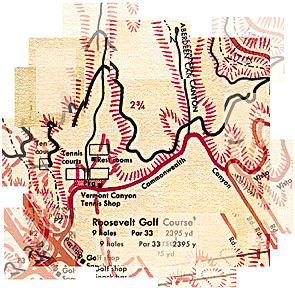 020897 
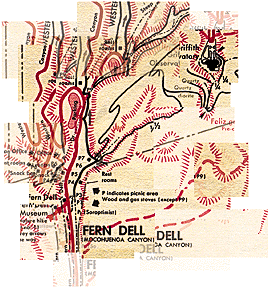  020898 020898
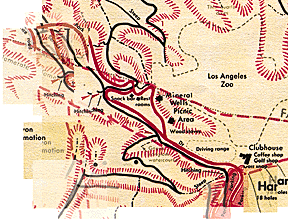 020997 
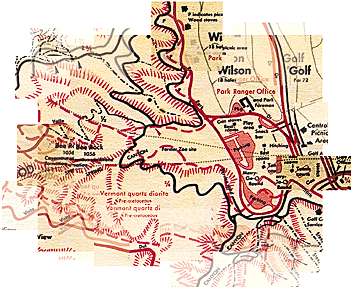 140997 
"Ultra-red's public space occupations recorded and compiled on Second Nature, detourn the bourgeois character of a public sphere which excludes any recognition of class conflict - specifically, an awareness which may lead to actions against bourgeois interests. "The true scandal surrounding park sex is not the transgression of public space by private pleasure. Rather, public sex remains scandalous because its prosecution exercises the truth of antagonistic social relations which constitute public space. Second Nature constructs a map of such a space, utilizing audio reproduction as a way of remembering social antagonisms even within queer space." CAN WE HAVE SOMETHING OTHER THAN NATURE, SO TO SPEAK? Ultra-red respond with a pastoral tale: "With the closing words, 'desublimation produces our citizenry,' Ultra-red's September 1997 ode to public pleasure succumbed to contingency. From the clash of private property and desublimated fraternity, Ultra-red were forced to attend to the point at which utopian hopes dissolve into material conditions. "Utopia isolated from its own conditions of articulation - its own chain of exclusions - resounds as little more than the empty promises of an autocrat. Or, from the perspective of the excluded (Tom of Finland's Kake Pleasure Park, with the warning "men only" posted at its entrance), the ideal utopia signifies less empty promises than tyrannical threats. "Ultra-red have been compelled to compose an ambient pastoral which retraces its steps from the given, back to the utopian."
 "It must be made a place of recreation for the masses, a resort for the rank and file of the plain people. I have but one request: that the public - the whole public - should enjoy with me this beautiful spot." - said the Colonel. "Buried in his mind were breathless references to this park overheard mostly in Hollywood gay bars and always uttered in quickened tones of excitement: 'You should have seen the numbers at Griffith Park the other afternoon!' . . . 'Let's take a drive to Griffith Park and: See The Sights!' . . . 'Her party was as crowded as Griffith Park!'" - said the sexual outlaw. "Homosexual encounters do not take place in the seclusion of a domestic setting but outside, in the open air, in forests and on beaches." - said the French revolutionary anti-Oedipus. "He listened, it seemed to me, just as com- posers using technology nowadays listen. He paid attention to each sound, whether 'musical' or not, just as they do; and he explored [his surroundings] with the same appetite with which they explore the possibilities provided by electronics." - said the Caged-bird. "The echo is, to some extent, an original sound, and therein is the magic and charm of it. It is not merely a repetition of what was worth repeating in the bell, but partly the voice of the wood; the same trivial words and notes sung by a wood-nymph." - said the Romantic. "I would 'musicalize' the idea of homosexuality: it exists only in its rhythm, its intervals and its pauses, it exists only through its (dramatic) movement, It conjugates invisibility and visibility in this rhythm of emergence and disappearance." - said the French revolutionary anti-bellum. "An actualized 'second nature', far removed from nature proper yet concrete at its own level, would be emancipated from artifice while at the same time retaining no suggestion of the 'natural'." - said the philosopher. Ultra-red site recordings and citations. The latter include "Colonel" Griffith J. Griffith, December 7, 1896, quoted in Griffith Park Master Plan, Department of Recreation and Parks, Los Angeles, November 1978 . . . John Rechy, Numbers . . . Guy Hocquenghem, Homosexual Desire . . . John Cage, M Writings '67 - '72 . . . Henry D. Thoreau, Walden . . . Guy Hocquenghem, "L'homosexualité est-elle un vice guérissable?" . . . Henri Lefebvre, The Production of Space . . . all other citations reproduced from Second Nature: The Political Economy of Cruising by the pinko-commie-skum of the ambient international.
 




 Ultra-red set up camp. Ultra-red set up camp.
". . . the policing of public sex, particularly the erotic adventures between men is thus instituted to guarantee in part that homogeneity [of the bourgeois public sphere]. "However, as civil libertarians have demonstrated, the entire apparatus of penalizing these activities stands on a tenuous distinction between private and public homosexual sex. The 1986 US Supreme Court decision of Bowers vs. Hardwick specifically refused to extend the right of privacy to homosexual conduct. Twenty-one States still retain laws prohibiting sodomy, which includes anal and oral sex. Given the fact that the law of the land sees all homosexual sex practices as potentially criminal, there is no such thing as private queer sex." "In an age of scandals surrounding public sexuality in the '90s, from presidents to pop stars, the majority of public sex offenders have no access to legal council, global news outlets, the entertainment industry or even the gay media. For the hundreds of men arrested each year for the offense of consensual flirtation with other men, the policing of public sex remains central in the fight for gay liberation. "In response to heightened legal and juridical assaults against queers in public space (where, in states like Michigan and Kansas, even a "pass" between men in pubic is a crime punishable by jail time), there is a need for local groups who are neither hesitant to embrace actually existing queer cultural practices nor adverse to locating their strategies within a coalition of issues around gay rights, the preservation of public expenditure, police abuse, civil liberties and working class struggle. "Numerous activists have argued that an effective resistance to homophobia must directly engage the bourgeois nature of public space itself. Not every subject position identified as gay shares the same cultural or economic interests. It is the role of the activist to embolden desublimation within the material context of bourgeois definitions of public space: definitions that are as rooted in economic interests as they are in cultural interests."
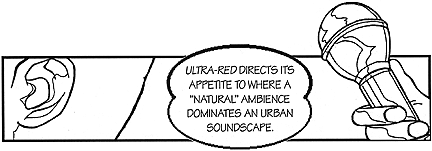 "Lesbian and gay rights advocates, conservative and liberal, who dismiss public sex as a marginal issue only contribute to the embourgeoisment of queer politics. They forget that civil rights are consistently denied to those who challenge bourgeois control over the public sphere. "Today's sex radicals remain prone to the same critique voiced in La Dérive Homosexuelle, Guy Hocquenghem's 1977 assault against queer consumerism. According to Hocquenghem, the liberalized - contra liberated - homosexual resembles '...a sex tourist, a nice Club-Med member who has been a bit further than the rest, whose horizon of pleasure is a bit broader than his average contemporary.' "As a prescription for political action, an idealist sex radicalism fails to counter the general perception both outside and within gay America that queers are affluent, privileged and exceptionally mobile. A perception that contradicts the true economic status and lived experience of the majority of queers. "Furthermore, by valorizing an ideal desire, sex radicals conceive of this population as a homogenous mass without competing interests or fundamental antagonisms due to class and race. In this sense, radicalism leads back to the root of the bourgeois sphere and its definitions of a homogenized public where antagonism requires regulation and sublimation."
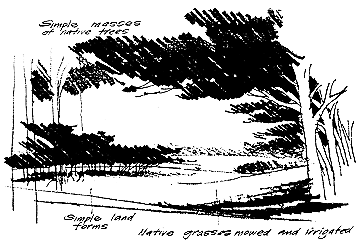 Map sections from Hileman's Recreation and Geological Map No. 3 of Griffith Park, Los Angeles Department of Parks and Recreation, 1968 . . . Compact disc illustration from Master Plan for Griffith Park, Los Angeles Department of Parks and Recreation, 1978 . . . Comic illustrations from Ultra-red's mixed media installation, Second Nature, Los Angeles Center for Photographic Study, September 1995 . . . All photographs from Griffith Park by Ultra-red, 1998 . . . Gratis to our comrades and/or all those desublimators OUT THERE IN THE PARK. Craig Collins, Comatonse Recordings, Daniell Cornell, Foundation for Artists' Resources, Gay and Lesbian Action Alliance, Frank Gutierrez, Ming-Yuen S. Ma, Seamus Malone, Terre Thaemlitz and Rex Wockner. Special thanks to Achim Szepanski and the staff of Mille Plateaux. Released under license from Comatonse Recordings. Email: info@comatonse.com. Related Comatonse Recordings website pages: Ordering | Reviews
|
|
|